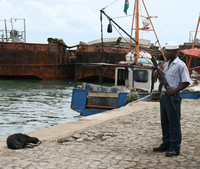ABOARD THE U.S.S. NASHVILLE -- In his civilian clothes, Dr. Augustus Vogel stood out among the khaki, green and blue uniforms of Nashville's military crew. As the U.S. Navy's science liaison for the amphibious ship's six-month "smart power" mission delivering training, humanitarian and scientific assistance to six West African nations, Vogel's responsibilities were as unusual as his dress. On April 17, Vogel sat down in the vessel's plush officer's lounge to confer with a small team of diplomats and naval officers. The topic of their hour-long discussion: fish -- and the catching thereof -- in the bustling, anarchic Gulf of Guinea. It's still rare for one of the Navy's powerful warships to host an in-depth, jargon-laden scientific discussion about fish. But with the emergence of smart power, it's becoming somewhat less rare. "We must focus our energies beyond the guns and steel of the military," Secretary of Defense Robert Gates said in a 2007 speech advocating this new approach to national security. The Pentagon would draw on civilian agencies, aid groups and academia to address the roots of conflict before they can blossom into full-scale international crises.
U.S. Navy Fights to Save West African Fisheries

